Martin Landau
Born 20 June 1928, Brooklyn, New York. Some publicity gives his year of birth as 1931 (sometimes 1932); the actual year is 1928. He died 15 July 2017, aged 89.
Best known for his role in Mission Impossible, the American actor's career reached it's peak in the 1994 with the Oscar for Best Supporting Actor for Ed Wood, and consolidated his position as a character actor.
Landau's father emigrated from his home, near Salzberg, Austria, when he was 12. Landau himself grew up in a poor, tough neighbourhood of varied European immigrants. He initially studied art at the Pratt Institute and the Art Students League in New York. At 17 he joined the New York Daily News as a staff artist, drawing caricatures for a column, and a cartoonist, assisting Gus Edson on his strip 'The Gumps'. Though the job was well paid and secure he decided after five years that he did not want to spend the rest of his life with the paper. He left to become a comedy writer and then a solo comic in a night club.
In the early 1950s television was expanding and he found many acting roles, generally as juvenile delinquents. He started to train as an actor, taking summer stock work, plays, "little theatre" groups, and drama classes for three years.
He then joined Lee Strasberg's Actors Studio: Landau and Steve McQueen were the only two out of 2000 others accepted that year. He gained prominent roles in New York plays, including Chekov's Uncle Varya and Franz Werfel's Goat Song. He began teaching drama classes, and while assisting Curt Conway in 1955 he met his future wife, Barbara Bain. She had just come from a modelling assignment and Landau initially thought her vain and vacuous, while she thought him arrogant and scruffy. However, at a party a fortnight later they met and reversed their former opinions, and thereafter became inseparable. A year and a half later, on 31st January 1957, they married in the New York City Hall, and on 10th February 1957 they married again in a religious ceremony.
Prompted by Bain to improvise Curt Conway's role in the current hit Broadway play Middle Of The Night, his interpretation impressed writer Paddy Chayefsky and he was awarded the role when it became available three months later. Landau acted on Broadway with Edward G Robinson, then went with the play on a six month tour of 16 cities in the U.S. and Canada. Bain also had a minor role, so the tour served as a honeymoon for them. The tour ended in Los Angeles, where Alfred Hitchcock saw him and gave him his film debut in North By Northwest (1959). He also appeared in the film Pork Chop Hill (59), and the Landaus made Los Angeles their home.
He appeared in several prominent film roles, some to critical praise, such as Cleopatra (62), The Hallelujah Trail (65), The Greatest Story Ever Told (65), They Call Me Mister Tibbs (1970), and as the title role in Welcome Home Johnny Bristol (1971). He also took guest roles in much television: The Twilight Zone (episodes Mr Denton on Doomsday, 1959, The Jeopardy Room, 1964), Wagon Train (60), The Untouchables (61), Bonanza (61), The Outer Limits (episodes The Man Who Was Never Born, 1963, The Bellero Shield, 1964), Alfred Hitchcock Presents (64), The Wild Wild West (65), Gunsmoke (66). He was offered the role of Illya in The Man From Uncle but he was not interested, though he appeared in the episode The Bat Cave Affair (1965).
In 1965 he was offered the role of Spock in Star Trek, but Landau rejected this for the part of a master of disguise in Mission: Impossible. This role was created for him by series creator Bruce Geller and was originally named Martin Land
, though this became Rollin Hand
. He played alongside his wife as Cinnamon Carter for three seasons, some 80 episodes, before leaving in 1968 when Paramount took over production and the standards of the scripts were in decline. He was in the 1970 Italian comedy Operation Snafu (aka Rosolino Paterno, soldato) in which he fell from a horse and hurt his back, an injury that caused him problems the rest of his life. In the early 1970s he starred in Joseph Stefano's pilot Haunted and another pilot Savage (1973), directed by Steven Spielberg and also starring Bain, and guest starred as twins in an episode of Columbo (1973). He turned down the leads for the series High Chaparral and, with Bain, McMillan and Wife, but in 1973 they both accepted the roles of Koenig and Helena in Space: 1999.
Gerry and Sylvia Anderson and Abe Mandell, later with writer George Bellak, had a series of three interviews with them in California in August 1973. Initially they met them at the Beverly Hills Hotel (where the Andersons and Mandell stayed from 29 July) and then at the Landaus Beverly Hills home (a Tudor style house built in 1922, the former Harvey Mudd Estate, called by the Landaus "Sous Les Arbres"). Landau and Bain moved with their two daughters to London in October 1973, while renting their Beverly Hills house to actor Bill Cosby.
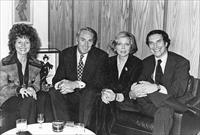
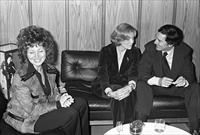
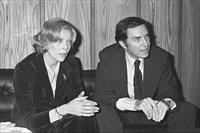
Sylvia Anderson, ATV deputy managing director Bruce Gyngell, Barbara Bain and Landau, probably in Los Angeles during August 1973, when they signed for the project.

While filming the first series of Space: 1999, the Landaus lived at 31 Maida Avenue, Little Venice, by Regent's Canal. In this picture (from the canal) it is the white house on the right. For the second series they lived at 49 Chester Square, in a fashionable Georgian square in Belgravia. Tony Curtis had previously rented this house while filming The Persuaders; neighbours included Dirk Bogarde at 44. Previously Mick Jagger lived on the street; later Margaret Thatcher would live there.
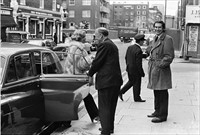
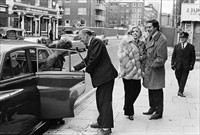
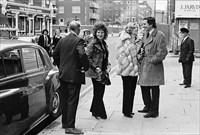
Martin Landau, Barbara Bain and Sylvia Anderson on George Street, Marylebone, London. The pub opposite, the Worcester Arms on 89 George Street is a listed Georgian building (now an Italian seafood restaurant). Beyond is the junction with the A4380 Gloucester Place. We're not sure what they are visiting, except that for many years there was a Tesco Express here. J. Jarvis and Sons were a London construction company, and the wooden panels indicate the building was being renovated.
Director Val Guest reported Martin was having terrible problems with Barbara at the time.
(this is not reported by other cast or crew and may have been an isolated row during the filming of Guest's episode). After the series finished in December 1976 the Landaus returned to California. They were separated in the early 1980s and divorced in 1993.
Subsequently Landau appeared in a number of B-movies, including Strange Shadows In An Empty Room (1977), Meteor (1979), Fall Of The House Of Usher (1979), The Being (1980), The Return (1980), Without Warning (1980), Alone In The Dark (1982), Access Code (1984), Cyclone (1986) and the British film Empire State (1987). He also appeared in the TV movies The Harlem Globetrotters On Gilligan's Island (1981 with Bain), Trial By Terror (1985), The Kung Fu Movie (1986) and The Return Of The Six Million Dollar Man And The Bionic Woman (1987). He guested in the series The Twilight Zone (episode The Beacon, 1985), Alfred Hitchcock Presents (1987), and Beauty And The Beast (1988). He was well received starring in a touring play Dracula (1984-85).
In 1989 Landau's role in the film Tucker (1988) earned him a Golden Globe award for best supporting actor, and an Oscar nomination in the same category. Subsequently he appeared in Woody Allen's Crimes & Misdemeanours (1989), earning another Oscar nomination. Later films included Paint It Black (1989), The Color Of Evening (1990). He also appeared in the tv movies The Neon Empire (1989), Max and Helen (1990), The Grand Tour (1990), By Dawn's Early Light (1990).
He finally earned an Oscar for best supporting actor for Ed Wood (1994) and was famously cut off in his acceptance speech. On the film set, director Tim Burton asked Landau to sign his Space: 1999 lunch box. His new prestige earned him parts in many major movies and TV miniseries. Highlights include: Pinocchio (1996) (and reprised in the New Adventures of Pinocchio (1999)), City Hall (1996), the X-Files movie (1998), Ed-TV (1999), Tim Burton's Sleepy Hollow (1999), Very Mean Men (2000), Ready To Rumble (2000), Shiner (2000), Very Mean Men (2000), Joyriders (2000), Haven (miniseries, 2000), In The Beginning (miniseries, 2000), The Majestic (2001). Hollywood Homicide (2003). The Commission (2003).
He guest starred in the TV series Without a Trace in 2004, earning his third Emmy award nomination, and reprised the role in two further episodes in 2005. In 2006 he was in the short lived series The Evidence, his first regular TV role since Space: 1999. He earned his fourth Emmy award nomination for his recurring role in the series Entourage (2006, 2008, playing a character inspired by producer Robert Evans, who sued the show for defamation). He was a voice in the animated film 9 (2009), the TV series The Simpsons (2010), and Tim Burton's film Frankenweenie (2012)
Landau was brought up on Jules Verne and H.G.Wells books and reads Asimov and Bradbury science fiction. Around the time of filming, Landau was 1.9 m (6'3") tall and weighed 84 kg (185 lbs). His hair was dark brown, his eyes blue.
He says of Space: 1999 "It was a much better show than people realise. We hit some, we missed some, we tried things."
He admits he preferred the first series. "I felt that it would grow. Episodes like the Christopher Lee show [Earthbound], The Black Sun and War Games were ones with ideas and integrity. Freddie Freiberger helped in some respects, but overall I don't think he helped the show. I think he brought a much more ordinary, mundane approach to the series. Space 1999 had a style of its own, a feel of its own, a look of its own, that would have grown if it had been left alone. It needed time and wasn't given that time. They rushed the process. If the format hadn't been changed, I know it would have been a hit."
He has said he would have done a third series if it returned to the first season format, but not if Freiberger was involved.
Landau has often recounted his battle with Freiberger over the scene when Koenig shoots Cantar in The Exiles. "There were things that Koenig was asked to do that I thought was pre-emptive. He said, 'No one'll pay attention.'
" (Weiner, 2016)
And I said, 'Are you kidding? The great thing about this is we don't attack people. We get attacked, and then we retaliate if we can.'
He said. 'Who'll know?'
I said, 'The same people who watched it the week before will know!' We hoped to get a loyal following, and they have to understand this character that has to be consistent, and you're [customizing him to] this particular story. As a result, you're selling the character down the river. I can't possibly justify this as the guy I was last week. It's a different guy!'
He said, 'You're making it very difficult.'
I said, 'No I'm not. We're doing a series. It's not like this is an anthology show. If this was an anthology, I'd be happy to change every week, but it's not.' ... People are inviting us into their living room because we're friends of theirs, and you can't just arbitrarily change this guy every week because you're telling a story.
And yet. We got along well. It was more of a constant battle than it should have been.
Landau was popular with cast and crew. Johnny Byrne commented Martin and Barbara were highly intelligent, invariably courteous to all and generous to a fault. They were a joy to work with.
Director Val Guest was one of the few who had difficulties with Landau. Martin had got an idea into his head as to how he should play his part, and anything I tried to do to goose him up was a bit of a strain for him.
On 26th September 2019, an auction of his estate included merchandise from his personal collection: his commlock prop ($9500), a script for The Void Ahead ($3250), 3 other scripts ($1500), Dinky Eagles plus Centuri/Ahi/Larami Eagles/HG jigsaw ($1600), 3 copies of the Year 1 pressbook ($950), Bagatelle ($325), press archive including interview schedule ($600), lunch box ($200), Donruss cards and unopened packs ($475).
Landau kept a large archive of tapes, scripts, press cuttings and documents.
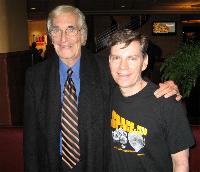
Landau was a guest at the 1978, 1986, 1992 and 2012 Space: 1999 conventions in the U.S. He appeared in The Space: 1999 Documentary (1996). He was a guest at the DragonCon 2011 convention in the U.S. and Autographica 2012 in the UK.
Kevin Connor on Martin Landau: He was and is a great guy, but it was a problem shooting Martin because he never liked to be shot on his left side. If you shot him on the right side, he looked good. But if you shoot him on the left side, he looks ten years older. So I had to plan my shots very carefully. Of course, he did not care if the bad Koenig (Seed of Destruction) was shot on the left!
Sylvia Anderson on Martin Landau: Martin and Barbara were tenacious when it came to their lines and how many they got and who would give the orders. So it was a little hard on Barry Morse and Nick Tate. But unfortunately Lew Grade had given Martin and Barbara a certain amount of creative input, which made it very difficult for us, the producers, at times. But I quickly found out that if you stood up to Martin, and you had a good case, it was quickly sorted out.
On his part, Landau says Sylvia Anderson never liked us. She had Robert Culp and other people in mind - if you're going to use someone in America, he's got to be more of a leading man and less a character actor. I knew that if I spoke too loudly, I'd be a nasty American, a colonist. The troublesome Americans.
Christopher Penfold on Martin Landau: We spent long, long hours into the night at their house in Little Venice, going through the scripts. Both of them took a fantastically close interest in the development of the stories, and they brought their own humanity, their own intelligence to the stories in a way that I, as a story editor, found tremendously rewarding, they were so fully engaged with the series.
Johnny Byrne on Martin Landau: And it wasn't an egotistical thing, it wasn't a questing around looking for more heroic stuff to perform, it was a genuine and honest integrity about making the scripts better. They were wonderful to work with in that respect, and we were very fortunate. The wrong kind of person in that position, with that kind of power as the leading actor and actress, could have made our lives hell. As it was they helped make good scripts better.
Ray Austin on Landau: At the beginning, none of the cast and crew knew Martin, but I did, I doubled for him on North By Northwest. I did the fall off Lincoln's nose for Martin and he's a great guy. Martin, if he'd had his way, would've had his dressing room at the other end of the block to Barbara's. It wasn't that great on the set with those two. It was a bit of a pain.
Copyright Martin Willey